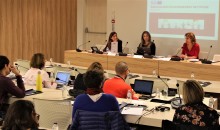
The final conference of the IJJO led project ‘Strengthening Juvenile Justice Systems in the counter-terrorism context: Capacity-building and peer-learning among stakeholders’ took place on the 29th of November at the Kartuizercenter Auditorium in Brussels (Belgium). This project aims to identify, promote and strengthen the political responses of juvenile justice systems and specialised programmes in order to tackle juvenile terrorism and violent extremism.
This final conference offered all project partners the opportunity to present their results, and in turn served as a presentation of the main outputs of the project as a result of this collaboration.
The day began with opening remarks from Adélaïde Vanhove, responsible for European Affairs at the IJJO; Diana Ungureanu, from the Directorate-General of Justice and Consumers of the European Commission; and Anita Perešin, of the Radicalisation Awareness Network (RAN) of the European Commission.
Later on, after a short presentation of the project’s context and activities by Adélaïde Vanhove, a presentation of the project's regional overview report, the white paper and the main results of the partners' national studies took place and a roundtable was carried out by Frances Sheahan, consultant in charge of writing the regional report and whitepaper, with discussions led by experts from the Ministries of Justice of Belgium and France, Universities of Zagreb (Croatia) and Miskolc (Hungary), the Ministry of Justice of Bremen (Germany), the Ludwig Boltzmann Institute for Human Rights (Austria), the Latvian Center for Human Rights, and the Dutch associations 180 Foundation and Defence for Children.
Subsequently, those attending the event participated to workshops focused on some of the case studies presented in the project's white paper, as examples of the use of diversion programmes, the right to privacy, the referral of minors to the adult courts for their judgment and sentence, and the process of rehabilitation and reintegration in society.
After the presentation of the conclusions of these workshops, a roundtable on juvenile justice and policies to fight terrorism was conducted, moderated by Maria-João Leote de Carvalho, professor and researcher at the Center for Sociological Studies of the Nova University of Lisbon (Portugal). During this session, several professionals intervened: Sophie Louis, from the Liège Prosecutor's Office of the King (Belgium); Pierre Smet, of the Subcommittee on Social and Human Sciences of the Belgian Commission of UNESCO; Julianne Laffineur, of the association Defense for Children (Belgium); Selma Kropp and Silvia Randazzo from the Ludwig Boltzmann Institute for Human Rights (Austria); Loubna Yacoubi, of the CAPREV association (Belgium) and Delphine Paci, lawyer at the Brussels Bar and the law firm Legalia (Belgium).After this roundtable, the evaluation of the project was presented by Carolyn Hamilton, director of the Coram's Children's Legal Center and responsible for this external evaluation.
The day ended with a debate among all attendees regarding the results of the project, as well as its impact and sustainability, in the context of the fight against terrorism. In particular, participants discussed and suggested the best ways to ensure the visibility and sustainability of the project’s website and its online community of practice.